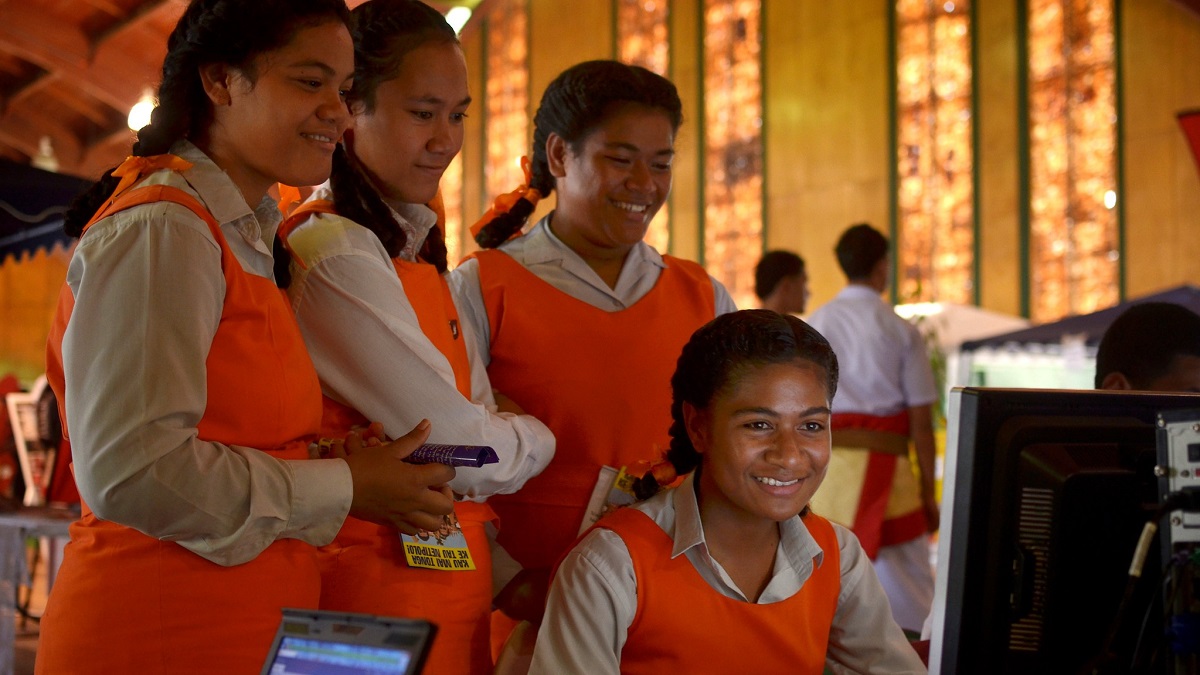Pacific Islands Forum joins UNCTAD-led eTrade for all initiative
The collaboration will help boost e-commerce in small island developing states by improving digital economy knowledge and capacity.

© World Bank/Tom Perry | University students in Tonga enjoy high-speed internet.
The eTrade for all initiative has gained a new member – the Pacific Islands Forum Secretariat (PIFS), raising the initiative’s membership to 35 partners.
PIFS will help strengthen e-commerce capacity-building and knowledge-sharing activities in the region and bring the Pacific region’s experiences to other partners and stakeholders.
“I am proud to lead this unique partnership that connects the dots between countries, partners and donors, and leverages the digital economy for inclusive and sustainable development,” said Shamika N. Sirimanne, director of UNCTAD’s division on technology and logistics.
“We look forward to engaging further with PIFS and other partners to expand the current support for e-commerce and digital development in the Pacific region for the benefit of all,” she added.
Playing a leading role in the Pacific’s development
PIFS is the region’s premier political and economic policy organization.
Founded in 1971, it comprises 18 members: Australia, Cook Islands, Federated States of Micronesia, Fiji, French Polynesia, Kiribati, Nauru, New Caledonia, New Zealand, Niue, Palau, Papua New Guinea, Republic of Marshall Islands, Samoa, Solomon Islands, Tonga, Tuvalu and Vanuatu.
PIFS is a leader in trade-related matters in the Pacific region, including in e-commerce.
“We are pleased to be the latest addition to the eTrade for all initiative and to join forces with partners to improve digital trade readiness in the Pacific,” said Mere Falemaka, ambassador of the Pacific Island Forum to the World Trade Organization and the United Nations in Geneva.
“The COVID-19 pandemic presented both challenges and opportunities for the world, including our region. It is therefore essential that Pacific businesses are well-equipped to face this new digital era to avoid the risk of falling behind,” she added.
PIFS initiated the Pacific E-commerce Initiative in 2017. E-commerce is one of the four priorities of the Pacific Aid-for-Trade Strategy 2020-2025, given its potential to narrow distances and trade costs, and to promote the diversification of Pacific economies.
Between 2017 and 2021, PIFS partnered with UNCTAD to conduct five eTrade readiness assessments and further leverage the related methodology, promoting and developing harmonized e-commerce assessments in six additional countries, with the latest conducted in Nauru in June 2021.
The findings of the assessments informed the development of a Pacific regional e-commerce strategy and roadmap, outlining the Pacific consensus on the priority regional measures to boost e-commerce readiness in the region and help businesses make the most of global online markets.
PIFS coordinates the implementation of the regional strategy, supported by numerous partners including the Pacific Digital Economy Programme, a joint initiative by the UN Capital Development Fund, UNCTAD and the UN Development Programme, with financial support from Australia.
Through this programme, UNCTAD assisted the Solomon Islands in developing its first national e-commerce strategy.
The Pacific e-commerce portal, a regional information repository on e-commerce development in the Pacific, was launched in August 2022.
Fostering partnerships to enhance capacity
Created in 2016, the eTrade for all initiative serves as a global helpdesk for information and contacts on technical assistance in policy areas key to the development of e-commerce and the digital economy in developing countries.
It has since generated widely acknowledged and vital spin-offs, such as the eTrade readiness assessments and the eTrade for Women initiative.
The initiative marked a new milestone in April 2022 with the enrolment of the International Chamber of Commerce as its principal private sector counterpart. This partnership leverages a global network of businesses and resources to maximize the impact of the digital economy.
The initiative’s various cooperation and spin-off activities have been funded by Australia, Estonia, Finland, Germany, the Republic of Korea, the Netherlands, Sweden, Switzerland and the United Kingdom.


